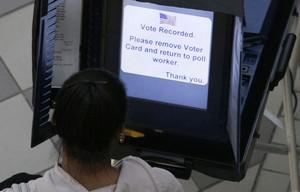The Russian connectionRussian government hackers hacked U.S. voting system manufacturer last August: NSA report
The hacking by Russian government hackers of the DNC computers and the email accounts of senior Democrats during the campaign has been amply documented, but vote-tallying was believed to have been unaffected, despite the concerted effort exerted by the Russian hackers. A highly classified NSA report, published by the Intercept on Monday, offers evidence that Russian government agents hacked a U.S. voting systems manufacturer last August, three months before the November 2016 presidential election. Security experts say that the suggestion that Russian government hackers may have gained access – even if limited access — to electronic voting systems is likely to increase worries about Russian interference in the 2018 mid-term and 2020 presidential election, as well as worries about growing Russian meddling in the election processes in other countries.

Russia failed to hack into the U.S. election // Source: theconversation.com
Russian government agents hacked a U.S. voting systems manufacturer last August, three months before the November 2016 presidential election, a highly classified NSA report details.
The document was given to the Intercept, by Reality Leigh Winner, 25, who has worked for Pluribus International Corporation in Augusta, Georgia, since 13 February. Pluribus has been a contractor for the NSA for a while, and in 2012 the NSA has opened a branch facility near August.
Winner was arrested and charged with removing classified material from a government facility and mailing it to a media outlet.
The Intercept writes: “The report, dated May 5, 2017, is the most detailed U.S. government account of Russian interference in the election that has yet come to light.”
Vladimir Putin wanted to see his preferred candidate, Donald Trump, win the November election because he viewed Trump as more likely than Hillary Clinton to pursue policies which would be helpful to Russian interests: Weaken NATO, encourage the dismantling of the EU, undermine the post-WWII international economic order, and accommodate Russia’s preferences in central Europe and the Middle East.
Moreover, Trump’s political style and personal idiosyncrasies, the Russian leadership concluded, would alienate traditional friends of the United States and reduce trust in U.S. words and commitmemts, thus further contributing to eroding U.S. global leadership and sway.
The U.S. intelligence community says that it was this analysis by Putin of the choice he was facing – either Clinton or Trump as the next U.S. president – which led him to instruct the GRU and FSB, two or Russia’s intelligence agencies, to work to help Trump win.
The two organizations launched a two-track campaign:
One track was the creation of more than 1,000 websites dedicated to manufacturing and spreading damaging fake stories about Hilary Clinton, stories which were then repeated and amplified by the informal network of alt-right’s websites and radio talk shows (one such story cost Michael Flynn’s son his security clearance and future job at the NSC: Flynn junior retweeted to his followers the fake story about how Clinton was running a pedophile sex ring out of a Washington, D.C. pizzeria).
